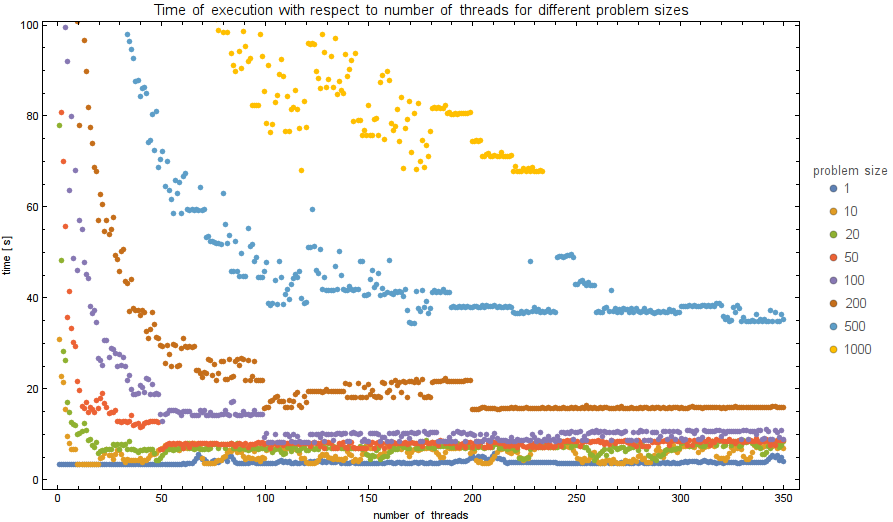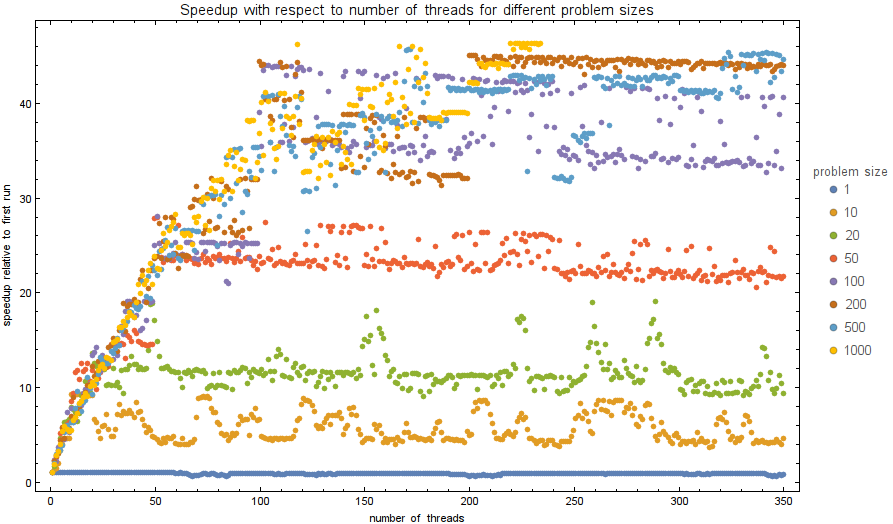Execution on Intel® Xeon Phi™ co-processor
Speedup by parallelization
We tested the speedups on the Intel® Xeon Phi™ with the following code:
1 #include <stdio.h>
2 #include <stdlib.h>
3 #include <string.h>
4 #include <assert.h>
5 #include <omp.h>
6 #include <math.h>
7
8 int main(int argc, char *argv[]) {
9 int numthreads;
10 int n;
11
12 assert(argc == 3 && "args: numthreads n");
13 sscanf(argv[1], "%d", &numthreads);
14 sscanf(argv[2], "%d", &n);
15
16 printf("Init...\n");
17 printf("Start (%d threads)...\n", numthreads);
18 printf("%d test cases\n", n);
19
20 int m = 1000000;
21 double ttime = omp_get_wtime();
22
23 int i;
24 double d = 0;
25 #pragma offload target(mic:0)
26 {
27 #pragma omp parallel for private (i) schedule(static) num_threads(numthreads)
28 for(i = 0; i < n; ++i) {
29 for(int j = 0; j < m; ++j) {
30 d = sin(d) + 0.1 + j;
31 d = pow(0.2, d)*j;
32 }
33 }
34 }
35 double time = omp_get_wtime() - ttime;
36 fprintf(stderr, "%d %d %.6f\n", n, numthreads, time);
37 printf("time: %.6f s\n", time);
38 printf("Done d = %.6lf.\n", d);
39
40 return 0;
41 }
The code essentially distributes a problem of size $n\cdot m$ among numthreads cores,
We tested the time of execution for $n$ from the set $\{1, 10, 20, 50, 100, 200, 500, 1000\}$
and numthreads from $1$ to $350$. The plots of exectuion times and performance speeups are shown below.
The code was compiled using:
icc -openmp -O3 -qopt-report=2 -qopt-report-phase=vec -o test test.cpp
without warnings or errors. Then, in order to offload to Intel Phi, user must be logged in as root:
sudo su
To run correctly, intel compiler and runtime variables must be sourced:
source /opt/intel/bin/compilervars.sh intel64
Finally, the code was tested using the following command, where test is the name of the compiled executable:
for n in 1 10 20 50 100 200 500 1000; do for nt in {1..350}; echo $nt $n; ./test $nt $n 2>> speedups.txt; done; done
Speedup by vectorization
Intel Xeon Phi has a 512 bit of space for simultaneous computation, which means it can calculate 8 double (or 16 single) operations at the same time. This is called vectorization and greatly improves code execution.
Consider the following code of speedtest.cpp:
1 #include <cmath>
2 #include <iostream>
3
4 int main() {
5 const int N = 104;
6 double a[N];
7 for (int i = 0; i < 1e5; i++)
8 for (int j = 0; j < N; j++)
9 a[j] = std::sin(std::exp(a[j]-j)*3 * i + i*j);
10 std::cout << a[4] << "\n";
11 return 0;
12 }
Intel's C++ compiler ICPC will successfully vectorize the inner for loop, so that it will run significantly faster than with vectorization disabled.
The code can be compiled with or without vectorization
$ icpc speedtest.cpp -o vectorized_speedtest -O3
$ icpc speedtest.cpp -o unvectorized_speedtest -O3 -no-vec
The below table shows execution times of the code displayed before on different machines with different settings. Two times represent execution time with double and float data type, respectively.
| Machine | ASUS ZenBook Pro UX501VW | Intel® Xeon® CPU E5-2620 v3 | Intel® Xeon® CPU E5-2620 v3 | Intel® Xeon® CPU E5-2620 v3 | Intel® Xeon Phi™ Coprocessor SE10/7120 | Intel® Xeon Phi™ Coprocessor SE10/7120 |
|---|---|---|---|---|---|---|
| Compiler | g++-6.3.1 | g++-4.8.5 | icpc-16.0.1 | icpc-16.0.1 -no-vec | icpc-16.0.1 -mmic | icpc-16.0.1 -mmic -no-vec |
| Double time[s] | 0.63 - 0.66 | 0.65 - 0.66 | 0.155 - 0.160 | 0.50 - 0.51 | 0.25 - 0.26 | 11.1 - 11.2 |
| Float time[s] | 0.65 - 0.71 | 0.53 - 0.55 | 0.155 - 0.160 | 0.17 - 0.19 | 0.37 - 0.38 | 4.2 - 4.3 |
We can see massive 44 fold speedup with and without vectorization.
Code incapable of vectorization
On the other hand there is a very similar code that can not be vectorized. Now all iterations of the inner loop access the same variable instead of each its own element in a list. ICPC is now unable to vectorize the code resulting in no difference when using -no-vec compile flag.
1 #include <cmath>
2 #include <iostream>
3
4 int main() {
5 const int N = 104;
6 double a;
7 for (int i = 0; i < 1e5; i++)
8 for (int j = 0; j < N; j++)
9 a = std::sin(std::exp(a-j)*3 * i + i*j);
10 std::cout << a << "\n";
11 return 0;
12 }
| Machine | ASUS ZenBook Pro UX501VW | Intel® Xeon® CPU E5-2620 v3 | Intel® Xeon® CPU E5-2620 v3 | Intel® Xeon® CPU E5-2620 v3 | Intel® Xeon Phi™ Coprocessor SE10/7120 | Intel® Xeon Phi™ Coprocessor SE10/7120 |
|---|---|---|---|---|---|---|
| Compiler | g++-6.3.1 | g++-4.8.5 | icpc-16.0.1 | icpc-16.0.1 -no-vec | icpc-16.0.1 -mmic | icpc-16.0.1 -mmic -no-vec |
| Double time[s] | 0.80 - 0.82 | 0.72 - 0.73 | 0.58 - 0.59 | 0.58 - 0.59 | 10.9 - 11.0 | 10.9 - 11.0 |
| Float time[s] | 0.69 - 0.72 | 0.66 - 0.67 | 0.32 - 0.33 | 0.32 - 0.34 | 4.1 - 4.2 | 4.1 - 4.2 |

